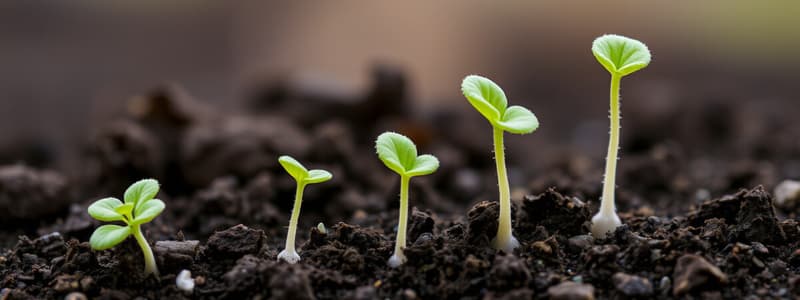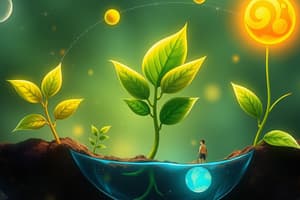Podcast
Questions and Answers
What is the primary focus during the vegetative stage of a plant's life cycle?
What is the primary focus during the vegetative stage of a plant's life cycle?
- Absorption of water and nutrients
- Formation of seeds and fruits
- Photosynthesis and energy acquisition (correct)
- Flowering and pollination
Which factor is NOT considered to affect a plant's life cycle?
Which factor is NOT considered to affect a plant's life cycle?
- Genetic factors
- Pollination methods (correct)
- Environmental conditions
- Soil quality
What is a distinguishing feature of biennial plants?
What is a distinguishing feature of biennial plants?
- They complete their life cycle in one year.
- They exhibit vegetative growth only in the first year. (correct)
- They can flower and produce seeds multiple times.
- They develop a root system during the reproductive stage.
Which stage of a plant's life cycle involves the activation of the seed through water absorption?
Which stage of a plant's life cycle involves the activation of the seed through water absorption?
In which life cycle type do plants typically live for multiple years, capable of flowering repeatedly?
In which life cycle type do plants typically live for multiple years, capable of flowering repeatedly?
Flashcards are hidden until you start studying
Study Notes
Plant Life Cycles
-
Definition: The series of stages that a plant goes through from seed to maturity, reproduction, and back to seed.
-
Key Stages:
-
Seed Stage:
- Contains the plant embryo and stored nutrients.
- Dormant until conditions are favorable (water, temperature, oxygen).
-
Germination:
- Activation of the seed; water absorption triggers growth.
- Emergence of the root (radicle) and shoot (plumule).
-
Seedling Stage:
- Young plant develops leaves and begins photosynthesis.
- Root system expands for nutrient and water uptake.
-
Vegetative Stage:
- Rapid growth of stems and leaves.
- Focus on photosynthesis and energy acquisition.
-
Reproductive Stage:
- Formation of flowers, fruits, and seeds.
- Involves pollination (transfer of pollen) and fertilization.
-
Mature Plant Stage:
- Fully developed plant capable of reproduction.
- May enter dormancy or continue growing.
-
-
Types of Plant Life Cycles:
-
Annuals:
- Complete life cycle in one year.
- Example: Beans, corn.
-
Biennials:
- Two-year life cycle.
- First year: vegetative growth; second year: flowering and seed production.
- Example: Carrots, parsley.
-
Perennials:
- Live for multiple years.
- Can flower and produce seeds repeatedly.
- Example: Trees, shrubs, and some herbaceous plants.
-
-
Factors Affecting Life Cycle:
- Environmental Conditions: Temperature, light, water availability.
- Genetic Factors: Species-specific traits and adaptations.
- Soil Quality: Nutrient availability and soil type.
-
Importance of Life Cycles:
- Understanding plant life cycles aids in agriculture and horticulture.
- Helps in conservation efforts and ecosystem management.
Plant Life Cycles
- Plant life cycles encompass the progression from seed to maturity, reproduction, and back to seed.
- Seeds consist of an embryo with stored nutrients, remaining dormant until conditions are favorable (adequate water, temperature, and oxygen).
Key Stages of Plant Life Cycle
- Seed Stage:
- Seeds wait for suitable environmental conditions to germinate.
- Germination:
- Triggered by water absorption; the seed activates to produce roots (radicle) and shoots (plumule).
- Seedling Stage:
- Young plants develop their first leaves and begin photosynthesis while expanding their root systems for improved nutrient and water absorption.
- Vegetative Stage:
- Characterized by rapid growth of stems and leaves, focusing on energy capture through photosynthesis.
- Reproductive Stage:
- Involves the development of flowers, fruits, and seeds, relying on pollination and fertilization for reproduction.
- Mature Plant Stage:
- Fully developed plants capable of reproduction; may enter dormancy or continue growing based on environmental cues.
Types of Plant Life Cycles
- Annuals:
- Complete their life cycle within a single year (e.g., beans, corn).
- Biennials:
- Spanning two years; vegetative growth occurs in the first year, with flowering and seed production in the second (e.g., carrots, parsley).
- Perennials:
- Live for multiple years, capable of flowering and producing seeds repeatedly throughout their lifespan (e.g., trees, shrubs, some herbaceous plants).
Factors Affecting Life Cycle
- Environmental Conditions:
- Includes temperature, light availability, and water resources that influence growth and development.
- Genetic Factors:
- Species-specific characteristics and adaptations that determine life cycle duration and strategies.
- Soil Quality:
- Nutrient levels and soil type significantly affect plant health and growth potential.
Importance of Life Cycles
- Knowledge of plant life cycles is crucial for improving agricultural practices and horticulture.
- Understanding these cycles is essential for effective conservation efforts and managing ecosystems.
Studying That Suits You
Use AI to generate personalized quizzes and flashcards to suit your learning preferences.




